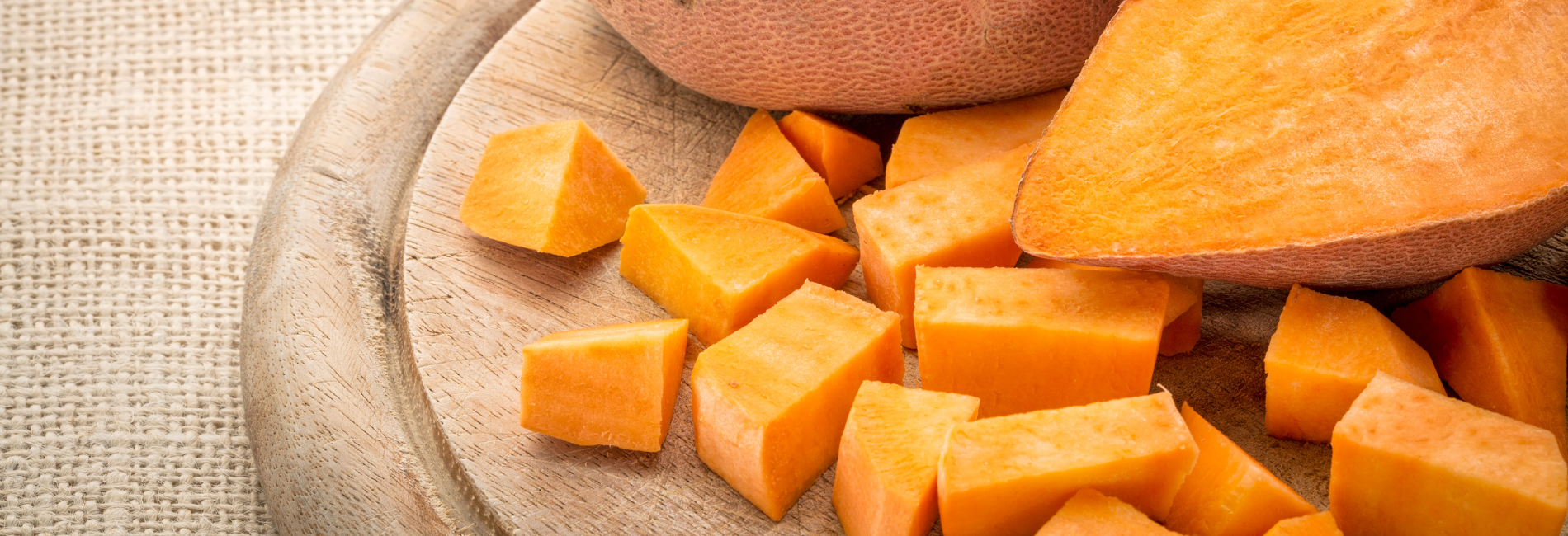Sweet potatoes are a beloved food in many households, known for their natural sweetness, easy digestibility, and comforting texture. Whether roasted, mashed, or used in soups and stews, they are a nutritious and versatile addition to any meal. However, for those following an alkaline or anti-inflammatory diet, the question often arises: Are sweet potatoes acidic?
The short answer is yes, but only mildly. Sweet potatoes are alkaline-forming in the body, even though their raw pH places them in the mildly acidic category. This distinction is important for those interested in how foods affect the body’s pH balance, digestive health, and overall wellness. In this article, we will explore the pH of sweet potatoes, how they interact with the body, and the numerous health benefits they provide—particularly for those managing acid reflux, inflammation, or pursuing a plant-forward lifestyle. You’ll also find a helpful acidity comparison chart and smart swaps to keep your meals both healing and satisfying.
Are Sweet Potatoes Acidic or Alkaline?
Sweet potatoes may seem starchy and acidic on the surface, but the truth is quite different.
Sweet potatoes are considered alkaline-forming in the body, even though they have a slightly acidic raw pH.
The raw pH of sweet potatoes ranges from 5.3 to 5.6, which places them in the mildly acidic category on the pH scale. However, once metabolized, sweet potatoes help neutralize acid and support a more alkaline internal environment.
In the world of natural health and alkaline diets, the important factor isn’t just a food’s pH outside the body—it’s how the body processes and reacts to it. The alkaline-forming effect of sweet potatoes is largely due to their mineral content, which plays a role in balancing pH levels in the blood and tissues.
What Is the Alkaline Effect of Sweet Potatoes?
The alkaline-forming nature of sweet potatoes comes from their high mineral content—especially potassium, magnesium, and calcium—all of which help balance pH levels in the blood and tissues.
When you eat sweet potatoes, your body breaks them down and metabolizes them in a way that reduces your “net acid load”. This helps to:
-
Lower systemic inflammation
-
Support kidney function
-
Ease symptoms of acid reflux and indigestion
-
Promote balanced energy without blood sugar crashes
The key here is the alkaline-forming effect that sweet potatoes have after digestion, which makes them an ideal food choice for maintaining a balanced pH in the body.
Nutritional Benefits of Sweet Potatoes
Sweet potatoes aren’t just pH-friendly—they’re packed with nutrients that support overall health and healing. Here are some of their most notable nutritional benefits:
|
Nutrient |
Benefit |
|
Beta-carotene |
A powerful antioxidant that converts to vitamin A, supporting vision, skin health, and immune function. |
|
Fiber |
Supports gut health, promotes regularity, stabilizes blood sugar, and aids in detoxification. |
|
Potassium |
Helps regulate blood pressure, supports muscle function, and promotes heart health. |
|
Magnesium |
Calms the nervous system, supports restful sleep, and aids in stress recovery. |
|
Vitamin C |
Immune-boosting antioxidant that supports collagen production for healthy skin and tissue repair. |
These nutrients, combined with their alkaline-forming properties, make sweet potatoes an excellent choice for anyone looking to support digestive health, reduce inflammation, and maintain overall wellness.
Sweet Potatoes vs. White Potatoes: Acidic or Alkaline?
While sweet potatoes and white potatoes are often thought of as similar, their impact on body pH differs significantly. Here's how they compare:
|
Type |
Raw pH |
Alkaline-Forming? |
Best Use for Acid-Sensitive Diets |
|
Sweet Potatoes |
5.3–5.6 |
Yes |
Ideal—especially with skin |
|
White Potatoes |
5.6–6.1 |
Slightly Acidic |
Use sparingly on an alkaline diet |
|
Yams |
5.5–6.0 |
Yes |
Excellent choice |
Pro Tip: Choose orange or purple sweet potatoes for the highest antioxidant content. The deeper the color, the higher the levels of anthocyanins and beta-carotene—both of which support overall health.
Interactive Chart: Where Sweet Potatoes Fall on the pH Spectrum
For better context, here's a visual comparison of common root vegetables and their acidity levels:
|
Food |
pH Range |
Acidic or Alkaline? |
|
Sweet Potatoes |
5.3–5.6 |
Mildly Acidic (Alkaline-forming) |
|
White Potatoes |
5.6–6.1 |
Mildly Acidic |
|
Carrots |
5.9–6.3 |
Neutral to Alkaline-forming |
|
Beets |
5.3–6.0 |
Mildly Acidic |
|
Turnips |
5.5–6.0 |
Mildly Acidic |
|
Kale |
6.4–6.8 |
Alkaline |
Pro Tip: For an alkaline meal, pair sweet potatoes with leafy greens, avocados, and almonds—these foods naturally support pH balance and digestive health.
Do Sweet Potatoes Trigger Acid Reflux?
Unlike spicy foods, coffee, and citrus fruits, which are common triggers for acid reflux, sweet potatoes are generally soothing to the digestive system. In fact, many alternative health practitioners recommend them for patients managing conditions like:
-
GERD (Gastroesophageal Reflux Disease)
-
Irritable Bowel Syndrome (IBS)
-
Leaky Gut Syndrome
-
Ulcers or gastritis
The high fiber content of sweet potatoes helps absorb excess stomach acid and promotes motility, which may reduce the pressure that causes acid reflux. Additionally, sweet potatoes are a great choice for people with digestive sensitivity, as they are easy to digest and non-irritating for most individuals.
However, it’s important to note that preparation matters. If sweet potatoes are prepared with heavy oils, butter, or paired with acidic sides like tomatoes or vinegar-based sauces, they could contribute to reflux symptoms. Always be mindful of how they are cooked and what they are paired with.
Best Ways to Eat Sweet Potatoes for Alkaline Support
To maximize the alkaline-forming effects of sweet potatoes, here are some smart cooking and pairing tips:
-
Steamed or Baked (Skin On): The skin contains extra fiber and nutrients that boost the food’s alkaline effect. Keep the skin on when baking or steaming for maximum benefits.
-
Mashed with Coconut Oil or Olive Oil: Skip the dairy and opt for plant-based fats like coconut oil or olive oil, which are gentle on the stomach and support digestion.
-
Paired with Leafy Greens: Pair sweet potatoes with spinach, kale, or arugula—these greens are alkaline-forming and provide additional digestive support.
-
In Smoothies: For a creamy, anti-inflammatory breakfast, blend steamed sweet potato cubes with cinnamon, almond milk, and chia seeds.
Who Should Be Cautious with Sweet Potatoes?
Sweet potatoes are generally safe and beneficial for most people, but there are a few considerations for individuals with specific health conditions:
-
Kidney Disease: Due to their high potassium content, people with kidney disease should monitor their potassium intake.
-
Oxalate Sensitivity: Sweet potatoes are moderately high in oxalates, which can affect individuals prone to kidney stones. If you have a history of kidney stones, it's best to consume sweet potatoes in moderation.
-
Blood Sugar Concerns: Although sweet potatoes have a lower glycemic index than white potatoes, portion control is important for diabetics or those managing insulin resistance.
Low-Acid Alternatives to Sweet Potatoes
If you find sweet potatoes difficult to digest or are following a rotation diet, here are some great low-acid, alkaline-forming alternatives:
|
Substitute |
Benefits |
Notes |
|
Butternut Squash |
Sweet, high in vitamin A |
Great in soups or purees |
|
Pumpkin |
Mild, gut-soothing |
Use fresh or canned (unsweetened) |
|
Carrots |
Crunchy, naturally sweet |
Excellent when steamed |
|
Plantains (ripe) |
Starchy, high in fiber |
Best when baked or boiled |
Final Thoughts: Are Sweet Potatoes Acidic?
So, are sweet potatoes acidic? Technically, yes—they fall into the mildly acidic category based on raw pH. But from a functional nutrition and natural health perspective, sweet potatoes are alkaline-forming, gentle on digestion, and incredibly nourishing for your body. They support pH balance, reduce inflammation, and are easy on the digestive system for most people.
For those following an alkaline diet or managing acid reflux, sweet potatoes are among the best comfort foods you can choose—when prepared wisely. They offer a wealth of nutrients, fiber, and antioxidants that support overall wellness, without disrupting your body’s internal pH balance.



